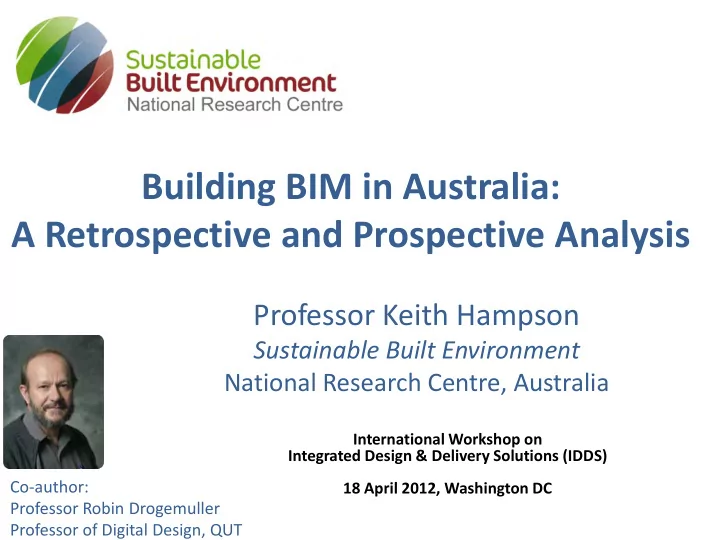

Building BIM in Australia: A Retrospective and Prospective Analysis Professor Keith Hampson Sustainable Built Environment National Research Centre, Australia International Workshop on Integrated Design & Delivery Solutions (IDDS) Co-author: 18 April 2012, Washington DC Professor Robin Drogemuller Professor of Digital Design, QUT
Presentation Structure 1. Background to Australia’s SBEnrc 2. Current BIM/IDDS initiatives 3. Future collaborations and goals 2
Australia’s Construction Industry • A$160B = US$160B = €120B pa turnover • Employs 1 million people • 250,000 firms many small firms … • Growing and slowing at same time … – Residential, Commercial, Industrial – Resources & Mining, Infrastructure 3
• Slower in productivity growth than others – nationally and internationally • Safety remains an issue • Strong growth in green construction • Declining public support for R&D as private support grows 4
Our Mission To be an enduring world-class research V and knowledge broker in sustainable infrastructure and building design, construction and management 5
Growth of Collaborative Research through Australia’s SBEnrc 1996 QUT/CSIRO Construction Research Alliance 2001 2009 2010 2012 2015 6
Program 1 - Greening the Built Environment Program 2 – People, Processes and Procurement Program 3 - Productivity through Innovation » A nation-wide collaborative research centre » Industry, government and research partners » Applied research and industry outreach across three integrated themes
Core Members Main Roads Western Australia Department of Commerce 8
Collaborating Partners
Collaborating Partners
www.sbenrc.com.au
SBEnrc = Public-Private Partnership in R&D • Build innovative networks of industry, government and researchers to deliver applied outcomes • Attract and mobilize resources globally • Research skills training for industry
Research Users Researchers We build bridges!
International Council for Research and Innovation in Building and Construction The Three IDDS Imperatives
Australian CRC for Construction Innovation (2001-2009) IDDS Projects Timeline Early Design Detailed Design Pre- Construction Facilities construction Management Design Automated Spec Scheduler Automated Design Estimator Integrated Design Parametrics View FM Check For Massing Studies Microclimates 15
IDDS models help us improve • Environmental, Social and Economic Aspects of – Where we build • Landform modelling under various conditions – What we build • Options, Scenarios – How we build • Visualisation, Fabrication, Coordination, Scheduling, Costing 16
17 Source: Martin Fischer, Stanford University
18 Source: Martin Fischer, Stanford University
“An Exemplar Project” 19
Modelling the Opera House 1952 to 2008 Physical models (1952 – 1972) BIM models (2003 - 2008)
1:48 Scale Physical Model made in 1972
All in the one building • Commenced 1958 • 1,500 performances • Opened 1973 • 1,000 other events • Cost $100M • 1,100,000 patrons • Value $2bn • 4,500,000 visitors • 1,000+ rooms • $85M business • 7 performance spaces • $21M FM budget • 60 dressing rooms all in year … • 5 restaurants & bars
All faces visible to survey dome will produce a very dense point cloud map. Generally the laser survey method will be adequate to 1m above finish floor level with conventional survey methods being used to generate the coordinate data. 3D surface laser scanning method
Comfort and Energy Simulation
FM Energy Monitoring Finnish Building Services system Ryhti
selected room Benchmark data for selected room Properties of the selected room Energy consumption history of Cleaning index selected room history
Integrated information: Energy usage Energy usage
Integrated information: Fire safety
Industry dissemination
Numerous Awards Created by Arup / JPW Architects Stuart Bull - Wayne Dickerson 31 Animation by Wayne Dickerson Associate JPW
National and international industry awards: Consult Australia … Project of the Year American Institute of Architects - Technology in Practice 32
Previous CRC for Construction Innovation Work Design Spec Design View NS 3940 Microclimates Automated Estimator 3D BIM Automated Design Scheduler Check Parametrics for Integrated FM Massing Studies
Looking ahead … 34
Modelling Implementation 35
Cultural transformation Business Effects of ICT Innovation START Long Lasting Competitive Markets Advantage Increased Transformation al Functionality Informational Increased Automational Productivity Increased Operational Tactical Strategic Thinking Thinking Thinking 36
Need enablers to move forward!
Object Libraries Open source digital modelling object library • In Australia approximately 20,000 “design” firms creating their own product libraries – Poor efficiency – No interoperability – No consideration of downstream use • Product manufacturers need to support multiple tools – Want single point of distribution 38
Project Product Library 39
40
Object Libraries • Our approach Shared generic Database Working in proof-of-concept Ifc-based Software transformations Direct insertion Revit ArchiCAD Bentley … into software 41
Object Libraries Object Library Server Meta schema Schema Transformations Objects software Manufacturers 42
Managing a Portfolio of Buildings • Queensland Government Assets – 1,300 schools, 70 TAFE campuses – 200 owned office buildings • 1 million m 2 office space – 65,000 units of social housing – 14 Correctional Centres – 170 Hospitals & Healthcare centres – 340 police stations – Major cultural buildings 43
Managing a Portfolio of Buildings • How do we manage all of these? • Build an asset register – Support strategic planning – Characterize by building type – Data collection through annual surveys – High level modelling of portfolio 44
Sensors for Infrastructure • What is the problem? 45
Sensors for Infrastructure • What is the problem? Image courtesy of Queensland Project Services Photos courtesy of The New York Times 46
Goodwill Bridge, Brisbane 47
Sensors for Infrastructure • What IT structure do we need? Asset Mgt User Asset System interface Model Data stream Flat file Sensors Asset data Arup Spreadsheet Analysis Predicted v Actual 48
49
Construction 2020 1. Environmentally sustainable construction 2. Meeting client needs 3. Improved business environment 4. Welfare and improvement of the labour force IDDS is central to our future 5. Advanced information and communication technologies 6. Virtual prototyping for design, manufacture & operation 7. Off-site manufacture 8. Improved construction processes 50
the new world The road is long, full of adventure, full of knowledge
5-9 May 2013, Brisbane, Australia 52
www.sbenrc.com.au 53
Recommend
More recommend